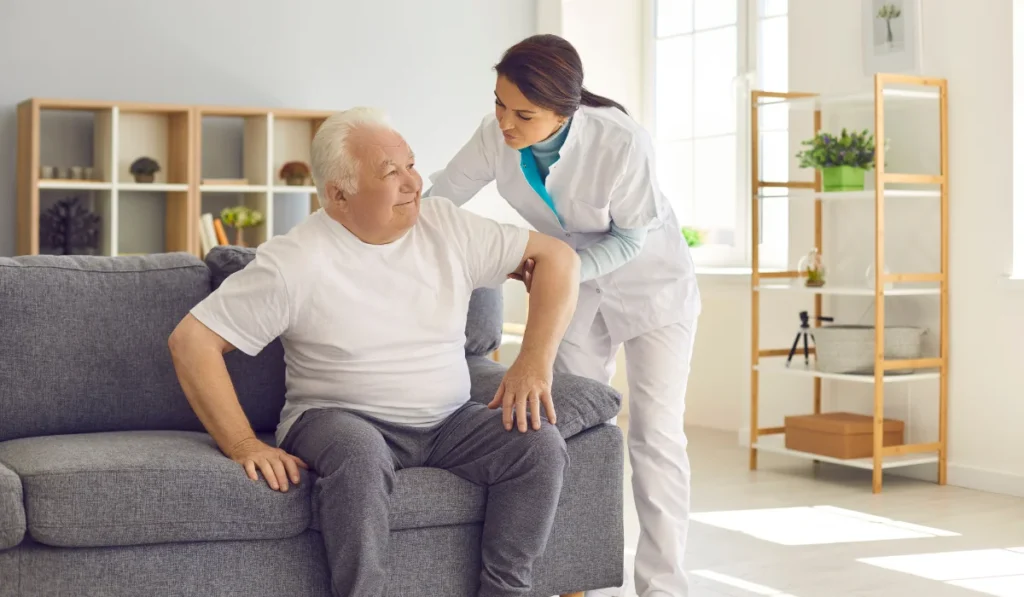
A career in healthcare doesn’t have to require years of schooling—becoming a Personal Care Aide (PCA) offers a rewarding path with a quicker start. With the right training and certification, you can begin working in home care in just a few weeks, making a meaningful impact on the lives of those in need.
Below, we’ll walk you through each step to becoming a certified PCA in New York—starting with what the role involves.
Key Takeaways
- PCAs help people with daily tasks and make sure they stay safe, comfortable, and independent at home.
- Basic requirements include being 18, passing a health check, and completing 40 hours of approved PCA training.
- After training, you must pass a test, get certified, and be added to the Home Care Registry.
- Certified PCAs can apply for jobs across NYC and must keep their skills and health records up to date.
Understand What a PCA Does
PCAs help people who are sick, elderly, or living with disabilities. They assist with activities of daily living (ADLs) like bathing, dressing, and eating. They work in clients’ own homes, nursing homes, or other long-term care settings.
This job is hands-on and involves helping people stay safe and comfortable while living as independently as possible.
If you enjoy helping others and want a career in healthcare, this might be a great fit.
Meet the Eligibility Requirements
Before you can become a PCA in New York, you need to make sure you’re eligible. The New York State Department of Health (DOH) has set basic eligibility rules:
- You must be at least 18 years old.
- You need to be legally authorized to work in the U.S.
- A high school diploma or GED is not required but can be helpful.
- You must pass a basic health screening, which includes vaccination checks (e.g., for COVID-19 and other common infections).
- Some PCA employers may also ask for a background check or fingerprinting.
If you meet these requirements, you’re ready to move forward.
Enroll in a PCA Training Program
To become a PCA, you need to complete a PCA training program (PCATP) approved by the New York State DOH. Training is offered at home care agencies, vocational schools, and some community colleges in NYC.
This program teaches you how to provide home care services safely and effectively. You’ll learn how to assist with ADLs, follow infection control practices, and handle emergencies.
Complete the Required Hours of Training
New York State requires that every PCA trainee completes 40 hours of training. These hours include both classroom instruction and hands-on practice. The hands-on portion is essential—it gives you real experience working with people who need care.
If you’re considering becoming a Home Health Aide (HHA) later on, keep in mind that HHA training is longer (75+ hours), but becoming a PCA first can be a great stepping stone into home health care.
Pass the Competency Evaluation
After your PCA training, you’ll need to pass a competency evaluation.
This test checks that you understand what you learned during training and can apply it safely in real-life care situations. The test may involve both a written section and a skills demonstration.
Once you pass, you’ll receive a PCA certificate showing that you’re qualified to work as a certified aide in New York.
Get Added to the Home Care Registry
Once certified, your information is added to the New York State Home Care Registry. This is a database used by home care agencies to verify that you’ve completed a personal care aide training program and are cleared to work.
Being listed makes it easier for you to find full-time or part-time PCA jobs in NYC.
Apply for PCA Jobs in New York City
Now that you’re certified, you can apply for PCA jobs in Brooklyn, the Bronx, Queens, or Manhattan. Many agencies offer flexible schedules and allow you to work full-time or part-time.
Some PCAs work under the Consumer Directed Personal Assistance Program (CDPAP), a Medicaid program that lets family members become caregivers. Places to apply include:
- Home care agencies
- Nursing homes
- Assisted living facilities
- Private clients
Keep Your Skills and Aide Certification Up to Date
To stay in good standing, you may need to complete ongoing training and stay current with health requirements like flu shots.
Some agencies provide regular in-service training to help PCAs stay up to date with infection control and new care techniques.
Take the First Step Toward a Career in Home Care
Becoming a PCA in New York is a great way to make a real difference in people’s lives. You’ll help older adults and people with disabilities live safely and comfortably in their own homes—and we’re here to help you begin that journey.
At Friends & Family Home Care, we offer a state-approved PCA training program designed to prepare you for success. Our training includes both classroom learning and hands-on instruction so you feel confident caring for those who need your help.
Ready to start your PCA career in NYC? Reach out today to learn more about our upcoming training courses and how to enroll.